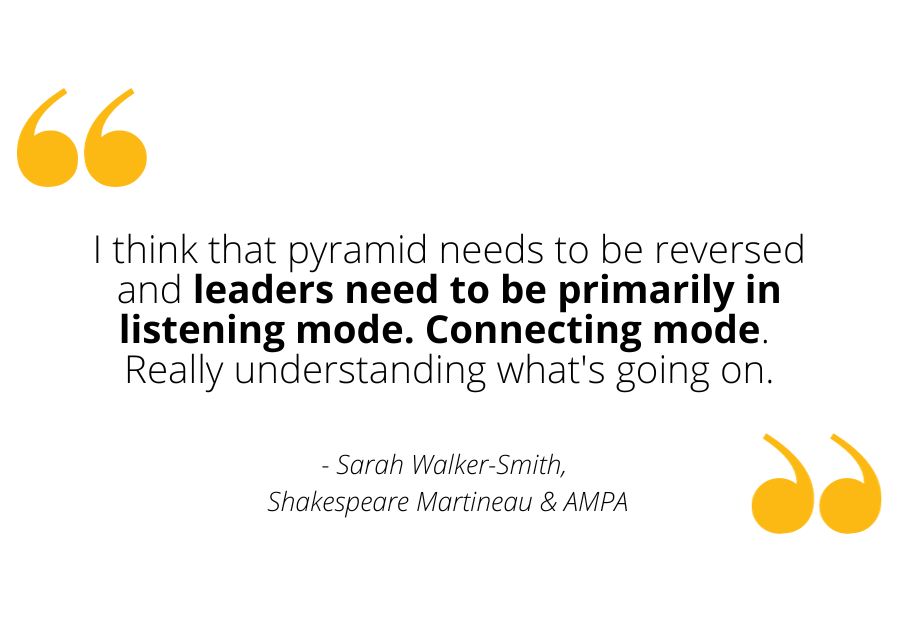In this episode of Your Digital Reputation, host Roger Christie interviews Sarah Walker-Smith, the CEO of AMPA and Shakespeare Martineau. Together they discuss the importance of social media for CEOs and the impact it can have on business as well as their own digital reputation. Sarah shares her own social media journey and how it has benefited her both personally and professionally.
Enhancing your own digital reputation is an opportunity every leader daily chooses to prioritise or ignore. Sarah’s journey is a powerful one of the benefits awaiting every single leader when choosing the former. This quote from Sarah sums it up: “Imagine how much your leadership could improve and how much your legacy can increase when you take the opportunity to harness a platform that scales like social media.” This is one leader case study you don’t want to miss. Tune in now to learn how social media can help you become a more visible and effective leader. Let’s dive in!

Social media for CEOs: The power of listening.
Roger Christie and Sarah Walker-Smith discuss the significance of dedicating regular time to actively listen and absorb information, an investment of time crucial for creating purposeful and meaningful content. They stress the importance of setting aside time to for social media reading, research, and engaging in conversations, as this allows leaders to gather valuable insights and ideas from others.
Sarah shares her personal experience of foraging for information before emerging with content. She explains that she spends a significant amount of time scrolling, reading and exploring what is out there. This listening mode enables her to gather information and ideas that she can later utilise to create content that aligns with her purpose.
Roger also shares his perspective, asserting that allocating time to listen is more important than allocating time to write. He suggests that by dedicating regular time to listen, individuals will naturally find the time to express something meaningful. He emphasises the value of engaging in conversations and effectively utilising time.

Social media in highly scrutinised & sensitive industries.
Roger and Sarah also explore the power of social media as a platform for public collaboration and problem-solving. They highlight how social media provides an incredibly empowering mechanism to engage with others and address complex issues. By openly acknowledging that they don’t have all the answers and expressing a willingness to listen, learn, and change, leaders can activate a global community of passionate individuals dedicated to positive change.
The speakers emphasise that social media operates on two levels. Firstly, it allows leaders to gather insights, connect with others, and understand different perspectives. It serves as a global focus group, providing access to valuable information from stakeholders to better comprehend the issues at hand.
Secondly, social media enables leaders to identify potential partners and collaborators who can help solve these complex problems. By engaging in conversations and sharing the process of listening, collaborating, and working together to find solutions, leaders can foster a sense of collective knowledge and hope.
The conversation also challenges the notion that leaders in highly regulated, scrutinised, or sensitive industries should shy away from using social media. Sarah, the CEO of a group of legal and professional services firms, is a powerful case study which challenges this; a leader who has successfully debunked the myths surrounding leaders’ use of social media. Despite the challenges and potential risks, Sarah remains visible, vocal, and unafraid to address the issues she is passionate about. This demonstrates that social media can be a valuable tool for leaders in any industry to engage with their communities, drive positive change, and become better leaders in the process.
The episode also emphasises that leaders need to prioritise listening, connecting, and understanding in order to find different solutions for the future. The traditional top-down approach to leadership, where leaders give edicts and communicate in a one-way manner, is no longer effective. Instead, leaders need to engage in dialogue with others and actively listen to different perspectives.
Social media is highlighted as a valuable tool for leaders to listen and understand stakeholder needs. It is described as the best global focus group when used correctly. By accessing the right information from stakeholders and identifying potential partners and collaborators, leaders can gain a better understanding of the issues at hand and work together to solve them.
Leaders should not only talk about the changes they want to make but also discuss the process they have gone through in listening, collaborating, and working together to solve problems. This transparency and openness can help build trust and credibility with stakeholders.
Overall, the episode underscores the importance of leaders being in a listening mode, connecting with others, and being open to changing their perspectives. It is through this approach that leaders can find different solutions for the future and effectively navigate the challenges they face.
Social media: a valuable tool to understand stakeholder needs.
The episode also emphasises that leaders need to prioritise listening, connecting, and understanding in order to find different solutions for the future. The traditional top-down approach to leadership, where leaders give edicts and communicate in a one-way manner, is no longer effective. Instead, leaders need to engage in dialogue with others and actively listen to different perspectives.
Social media is highlighted as a valuable tool for leaders to listen and understand stakeholder needs. It is described as the best global focus group when used correctly. By accessing the right information from stakeholders and identifying potential partners and collaborators, leaders can gain a better understanding of the issues at hand and work together to solve them.
Leaders should not only talk about the changes they want to make but also discuss the process they have gone through in listening, collaborating, and working together to solve problems. This transparency and openness can help build trust and credibility with stakeholders.
Overall, the episode underscores the importance of leaders being in a listening mode, connecting with others, and being open to changing their perspectives. It is through this approach that leaders can find different solutions for the future and effectively navigate the challenges they face.
Feel free to drop Roger Christie a note with any thoughts from this conversation. If you want more on all things digital reputation, be sure to subscribe below to the Your Digital Reputation newsletter. Join hundreds of subscribers from around the world already signed up!